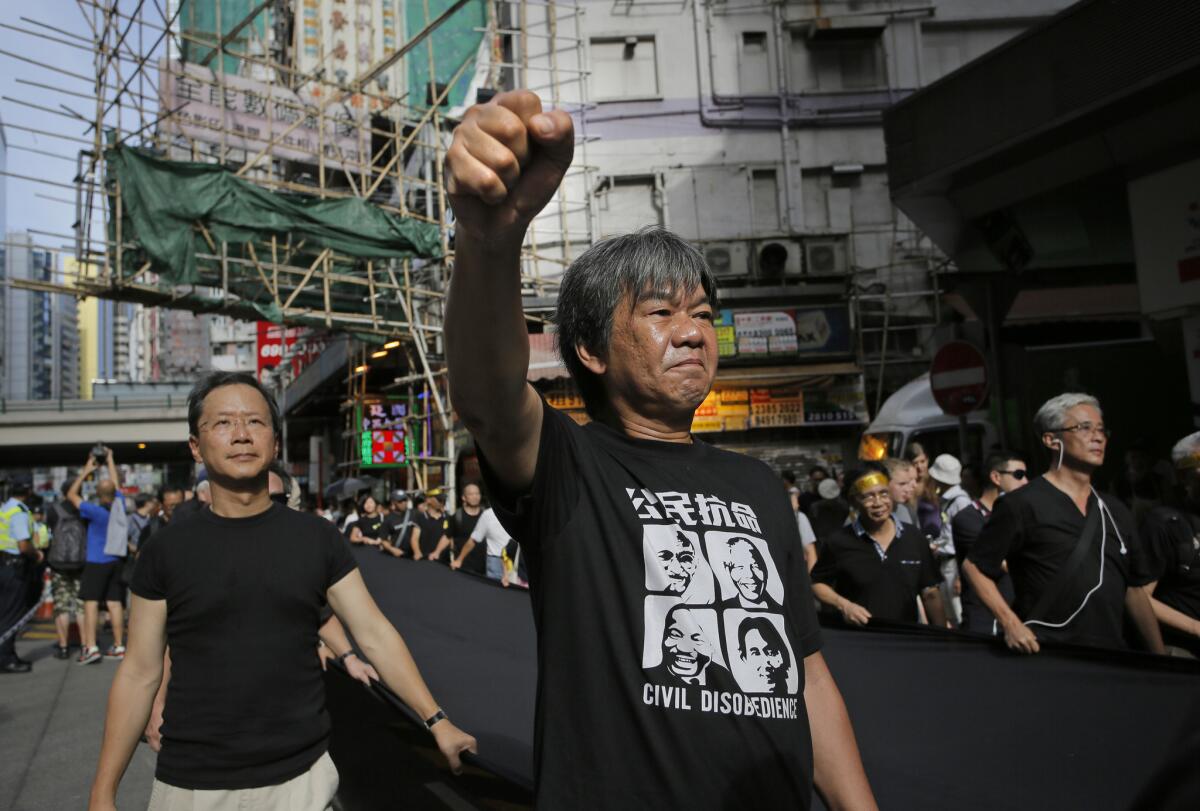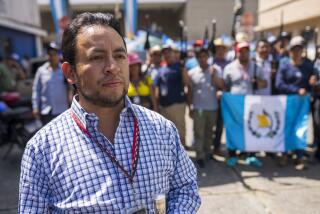Prominent Hong Kong activist says protesters need to unify, strategize

- Share via
Reporting from Hong Kong — Hong Kong’s pro-democracy protest organizers need to rethink their strategy and bring disparate factions together under a new structure to help lead the movement forward, a prominent left-wing lawmaker from the semiautonomous city urged this week. Failure to do so, he warned, would squander a historic opportunity.
“Every day that passes by, we waste another opportunity. Without leadership, the crowds won’t stick around long,” said Leung “Longhair” Kwok-hung, chairman of the League of Social Democrats.
“If you want to achieve a goal in the long term -- in this case, true democracy in Hong Kong -- you need to unify all powers who are fighting for this goal and establish a platform to let them all participate,” he told the Los Angeles Times. “In that way, you are representing all supporters.”
A variety of groups coalesced behind the democracy sit-ins, including Occupy Central With Peace and Love and two student groups: Scholarism and the Hong Kong Federation of Students.
Leaders of those three main groups have expressed mutual support and have all spoken frequently to the crowds of protesters. But many people who have joined the demonstrations over the last month say they’re not allied with any of those organizations and have “spontaneously” joined the protests.
The diffuse nature of the protest leadership may have helped perpetuate the demonstrations – but also has limited protesters’ ability to forcefully unite and agree on a strategy to bring more pressure to bear on government authorities.
Leung’s remarks came as two founders of Occupy Central, university professors Benny Tai and Chan Kin-man, announced they have resumed their university teaching duties after a month spent mainly at the protest zone in the Admiralty district, near government headquarters.
Tai told reporters this week that the move does not indicate a retreat and said he and Chan would continue spending a lot of time in Admiralty. But one senior member of Occupy Central, who spoke on condition of anonymity because of the sensitive nature of the issue, said differences between the protest leaders contributed to their decision to go back to work.
“They have different views about how to lead the movement forward,” said the member, adding that the advice of Occupy Central founders had been repeatedly ignored by the student groups.
Hong Kong, a former British territory, returned to Chinese rule in 1997 under a framework known as “one country, two systems.” Terms of the handover included a gradual move toward fully democratic elections and a high degree of political autonomy from China’s Communist rulers for 50 years.
Leung -- a well known rabble-rouser partial to Che Guevara T-shirts -- has been active in the sit-ins since day one, becoming one of the first people to sit down in front of the cordoned-off plaza at Hong Kong’s Legislative Council last month to voice his displeasure over limits set by mainland Communist authorities on who can run in Hong Kong’s 2017 chief executive elections.
Thousands of students joined him, and dozens of students were arrested, including Federation of Students general secretary Alex Chow and Scholarism leader Joshua Wong. As they were detained by police last month, Leung dropped to his knees in front of other protesters, imploring them to stay and keep fighting for “true democracy.”
“I have never knelt down to the tyranny of the Communist Party, but today I feel humble, I will bow to true democracy,” Leung said in front of a large crowd of protesters in Admiralty.
Last week, a group of five Hong Kong government officials engaged in a two-hour dialogue with five representatives of the Federation of Students over the protesters’ demands and 2017 election rules.
But the session yielded little, and no further discussions have been scheduled.
Leung said the government’s decision to talk only to the Federation of Students was a tactical move to divide the protesters.
“Students are easier to control,” he said.
Government authorities don’t want to talk to lawmakers and other political actors because they fear ceding any political power to pro-democratic parties of individuals, he added. But he said the protests have grown far beyond a student movement, and students cannot represent all the demonstrators.
Leung said he tried to persuade Tai to form a new group called United Front to unify the protest movement and mobilize more Hong Kongers to support it. But he said Tai rejected the idea, saying the time was not right.
“In terms of forming a ‘United Front,’ we need to have a common position, and most importantly, discussion on our strategy,” said Leung. “But there is no leadership and very little cooperation.”
Hui is a special correspondent.
More to Read
Sign up for Essential California
The most important California stories and recommendations in your inbox every morning.
You may occasionally receive promotional content from the Los Angeles Times.










